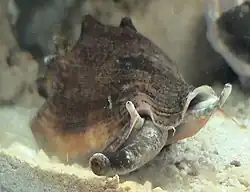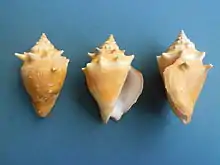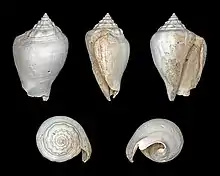| Strombus alatus | |
|---|---|
 | |
| Front view of S. alatus showing the snout in front and stalked eyes behind, one of which reaches out through the stromboid notch in the shell | |
 | |
| Scientific classification | |
| Domain: | Eukaryota |
| Kingdom: | Animalia |
| Phylum: | Mollusca |
| Class: | Gastropoda |
| Subclass: | Caenogastropoda |
| Order: | Littorinimorpha |
| Family: | Strombidae |
| Genus: | Strombus |
| Species: | S. alatus |
| Binomial name | |
| Strombus alatus (Gmelin, 1791) | |
| Synonyms | |
| |
Strombus alatus, the Florida fighting conch, is a species of medium-sized, warm-water sea snail, a marine gastropod mollusk in the family Strombidae, the true conchs. Its name derives two Latin words. Strombus means, in Latin, a snail with spiral shell, which derives from the Greek στρόμβος, meaning anything turned or spun around, like a top or, as in Aristotle's Historia Animalium, a sea snail. Alatus means, in Latin, "winged".
Distribution
This conch occurs in the Western Atlantic Ocean from North Carolina to Florida and the Gulf of Mexico, Louisiana, Texas, and the east coast of Mexico.[1][2]
Description
The shell can be as large as 112 mm (4.4 in).[1][3]
This species is closely similar to Strombus pugilis, the West Indian fighting conch, which has a more southerly range. S. alatus shells have less prominent subsutural spines and slightly more projected outer lips. Some scientists have treated the two as distinct species; others as subspecies.[4] In an extensive study of the Stromboidea in 2005, Simone provisionally treated these as distinct species, but observed, "no spectacular morphological difference was found [and] all related differences, even those of the genital system, can be regarded as extreme of variation of a single, wide distributed, variable species."[5]
Phylogeny

from Caloosahatchee Formation, Sarasota, Florida, USA
A cladogram based on sequences of nuclear histone H3 gene and mitochondrial cytochrome-c oxidase I (COI) gene showing phylogenetic relationships of (32 analyzed) species in the genus Strombus and Lambis, including S. alatus, was proposed by Latiolais et al. (2006):[6]
| ||||||||||||||||||||||||||||||||||||||||||||||||||||||||||||||||||||||||
| Phylogeny and relationships of Eastern Pacific and Atlantic Strombus species, according to Latiolais et al. (2006)[6] |
Habitat
The minimum recorded depth for this species is the surface; the maximum recorded depth is 183 m.[3]
References
- 1 2 "Malacolog ver. 4.1.1". The Academy of Natural Sciences. Retrieved 30 September 2009.
- ↑ Perry, H.; Larsen, K. (2004). "Strombus alatus Gmelin, 1791 Florida Fighting Conch" (PDF). A Picture Guide to Shelf Invertebrates from the Northern Gulf of Mexico. Retrieved 27 June 2010.
- 1 2 Welch J. J. (2010). "The "Island Rule" and Deep-Sea Gastropods: Re-Examining the Evidence". PLoS ONE 5(1): e8776. doi:10.1371/journal.pone.0008776.
- ↑ Simone (2005): Comparative Morphological study of representatives of the three families of Stromboidea and the Xenophoroidea (Mollusca, Caenogastropoda), with an assessment of their phylogeny Archived 5 March 2012 at the Wayback Machine, p. 142.
- ↑ Simone (2005): Comparative Morphological study of representatives of the three families of Stromboidea and the Xenophoroidea (Mollusca, Caenogastropoda), with an assessment of their phylogeny Archived 5 March 2012 at the Wayback Machine, p. 169.
- 1 2 Latiolais J. M., Taylor M. S., Roy K. & Hellberg M. E. (2006). "A molecular phylogenetic analysis of strombid gastropod morphological diversity". Molecular Phylogenetics and Evolution 41: 436–444. doi:10.1016/j.ympev.2006.05.027. PDF.